The housing complex, still under construction in Porterville, California, will be called Nupchi Xo' Oy. The name pays tribute to Joseph Darrel Vera, who worked to bring affordable housing to members of the Tule River Tribe. Vera died just before the complex, in a city in the San Joaquin Valley near the reservation, came to fruition. His Indian nickname is Nupchi, meaning "cousin." The complex is being called "Village of the Cousins."
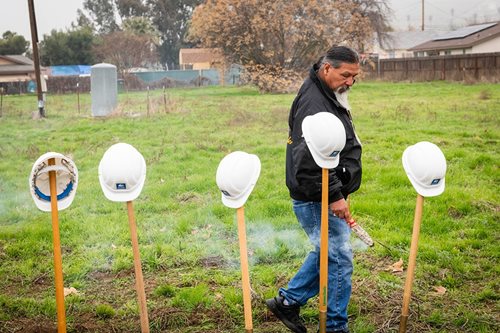 "In many cultures, you're related to everybody, so everybody is your cousin," says Susan Janoko, interim executive director of the Tule River Housing Authority. "You can maintain your connectivity in this village of the cousins, and that's important for this tribe." The project, which will provide single and multi-family housing for tribal members, is a partnership between the Tule River Tribe and Self-Help Enterprises, a NeighborWorks organization. It will allow tribal members who live in Porterville to be together as a community.
"In many cultures, you're related to everybody, so everybody is your cousin," says Susan Janoko, interim executive director of the Tule River Housing Authority. "You can maintain your connectivity in this village of the cousins, and that's important for this tribe." The project, which will provide single and multi-family housing for tribal members, is a partnership between the Tule River Tribe and Self-Help Enterprises, a NeighborWorks organization. It will allow tribal members who live in Porterville to be together as a community.
The goal was to build housing in a place where many tribal members work, Janoko says. Because of a lack of l flat, buildable land and lack of infrastructure, including water and sewer, homes on the reservation are experiencing severe overcrowding. "We just needed housing," she says. There are about 1,100 tribal members who live on the reservation and about 850 tribal members who live off the reservation. The new project will contain 16 single family houses and 24 townhomes. There will also be a community center. 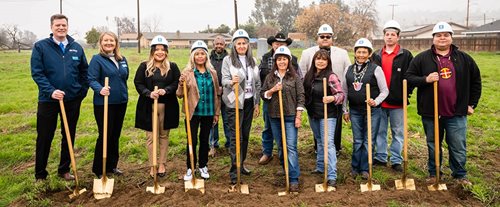
Tom Collishaw, president and CEO of Self-Help Enterprises, says his organization had been looking for funding streams for projects with local tribal nations and had begun talking to Tule River representatives years before they broke ground in January. "We started to have rich conversations about how we might work together," he says. "We developed a memorandum of understanding and they found a site off reservation, in the largest nearby city. They had an architect. We put together the pieces of funding to make it work."
Obtaining financing for the property posed some challenges, says Betsy McGovern-Garcia, program director for Real Estate Development with Self-Help Enterprises. While several affordable housing programs have carveouts for tribal housing, many of those carveouts exist within rural set-asides. Porterville is not considered rural, so they had to compete against other, traditional projects. "We've got such a great partnership and we are both committed. Therefore, it came together really nicely."
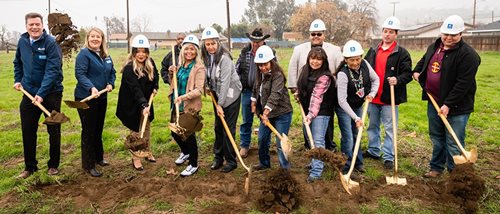 The project received federal tax credits which will generate $10,898,355 of equity for the project. Other funding came from Housing and Urban Development's Native American Self Determination Act. Eight of the units will be reserved for tribal members, while other units will have tribal preference.
The project received federal tax credits which will generate $10,898,355 of equity for the project. Other funding came from Housing and Urban Development's Native American Self Determination Act. Eight of the units will be reserved for tribal members, while other units will have tribal preference.
Along with providing needed housing, the project includes a community space for tenants, Janoko says, and that's needed, too. "We plan to have workshops and classes on training our tenants on good financial management, so they will have the opportunity to a. clean up their credit and b. obtain financial management skills so that c. ultimately they will become homeowners. That really was the ideal for public housing when it was developed in the 1960s: Transition to make good practices so that someday, you can be a homeowner." There will also be classes on tribal culture and a focus on culture for youth. Support, to help youth keep up with their studies, will be available as well.
Already, the two organizations are starting to receive rental applications. The goal is to open in 2021.
Collishaw says Nupchi Xo' Oy is in line with Self-Help's strategic planning. "We wanted to serve and expand our impact and that includes working with partners," he says. This will be the organization's first partnership with the tribal community.
For the Tule River tribe, the goal is to eliminate overcrowding and to provide a sense of community for people who live off reservation. But they've also received queries from individuals who live on the reservation, Janoko says. "We are so grateful for our partners and the experience they bring. People don't understand from the outside how much planning, how much double checking, how much compliance goes into this."
McGovern-Garcia says the design is lower density than other recent housing developments, allowing room for large families and multigenerational households to share space in their dwellings. There will be ample green space, she says, and a playground. "The design was really thought through by the Tule River community before it got to us; it's representative of the Tule community and the people we're trying to serve."
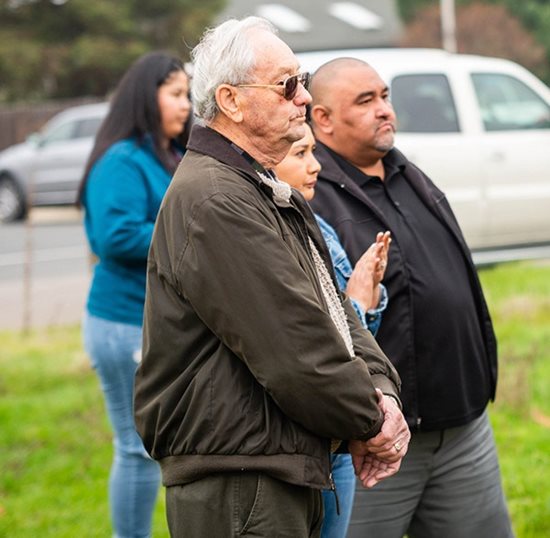 McGovern-Garcia says Self-Help's mission is to support low-income families and communities, and the Tule River Tribe is an important part of the San Joaquin Valley. The hope is to move some families in as soon as January, and to finish the project by the end of March. "It was a great partnership. They did a lot of the upfront work; we brought the financing."
McGovern-Garcia says Self-Help's mission is to support low-income families and communities, and the Tule River Tribe is an important part of the San Joaquin Valley. The hope is to move some families in as soon as January, and to finish the project by the end of March. "It was a great partnership. They did a lot of the upfront work; we brought the financing."
McGovern-Garcia says she recently stood at the site and looked out from the second floor over the construction. "We've got houses up. We've got paint on the sides of the community center. It warms my heart knowing in the next couple of months, we'll be moving in families. They'll
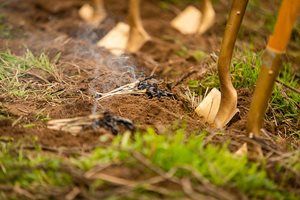 be able to have dinner together as a family, the kids will have a place to study and they'll be able build for the future."
be able to have dinner together as a family, the kids will have a place to study and they'll be able build for the future."Collishaw describes Self-Help's role as "codevelopers" while the Tule River Housing Authority gains its own expertise. "We're thrilled to help them do their first project of this size and scope," he says.
What's next? "The wheels are churning," says Janoko. She says the housing authority has been talking with tribal leadership about the need for infrastructure, which may pave the way for future projects on the reservation itself. Meanwhile, she says, they are starting to review applications to fill up Nupchi Xo' Oy.

